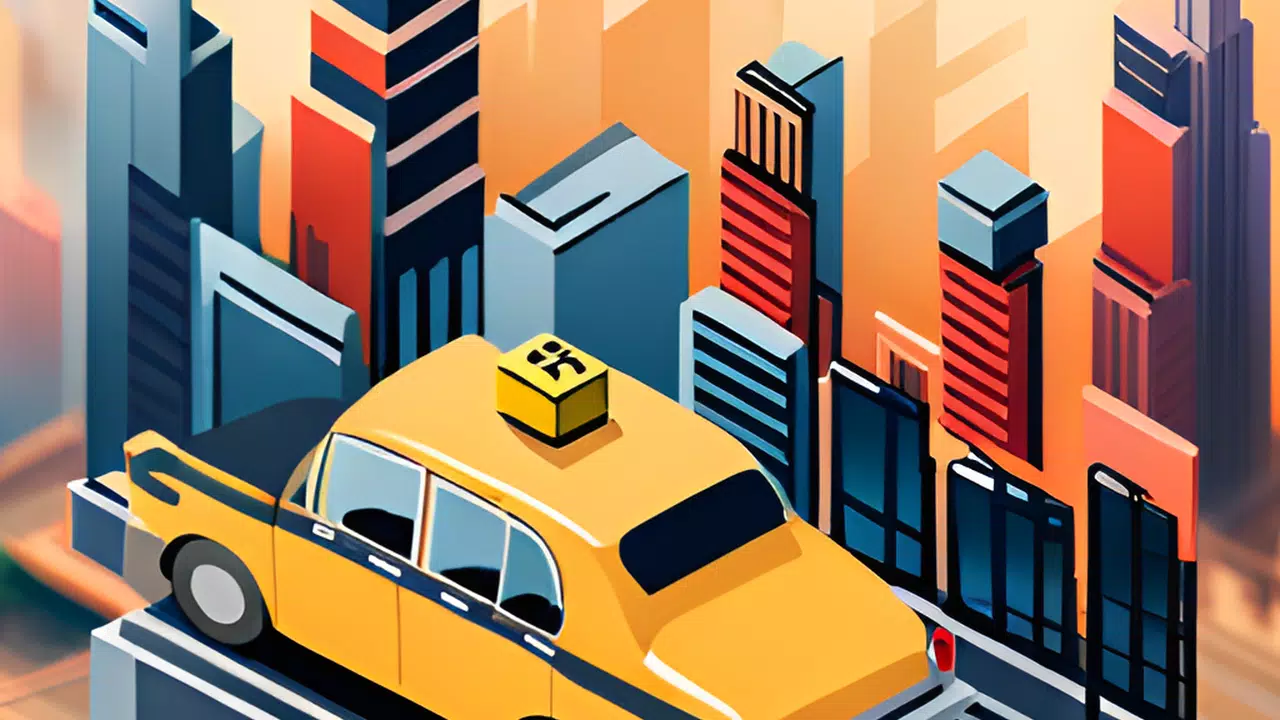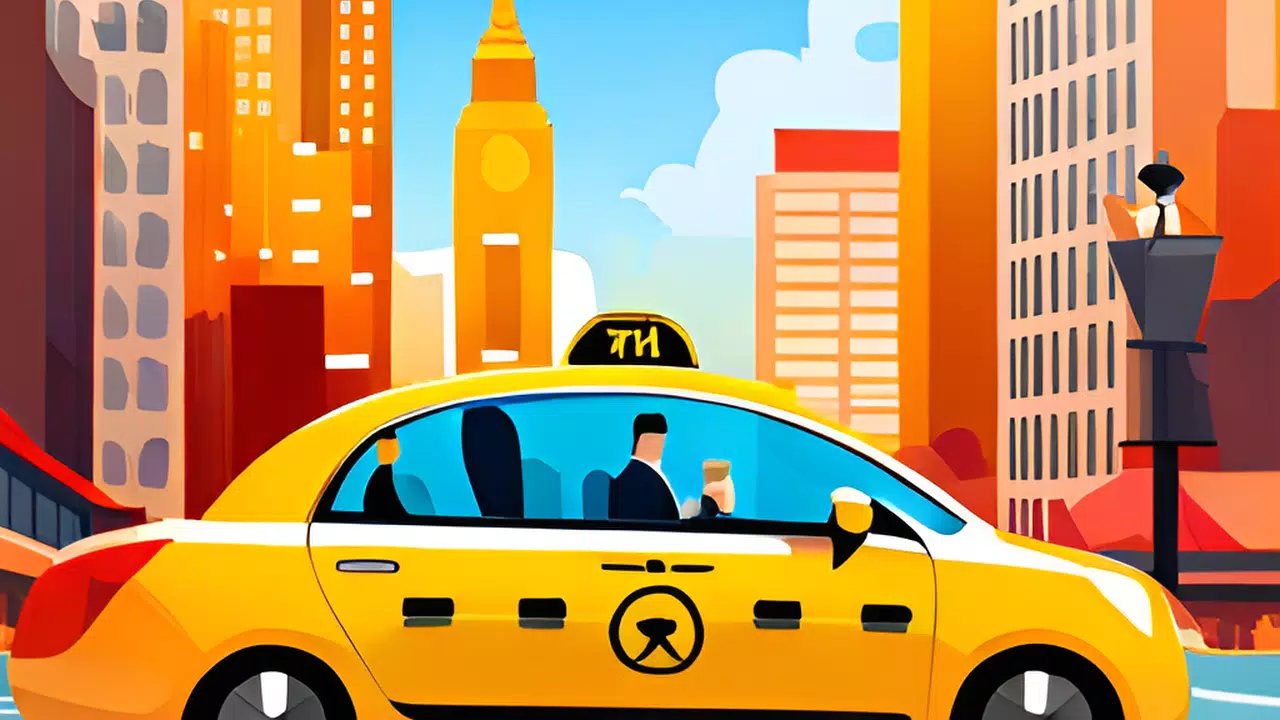
The Competitive Taxi License Market in Cluj-Napoca
Taxi licenses are essential for legally operating a taxi business in Cluj-Napoca. The town hall issues taxi permits for only 150 lei, but the limited availability of permits has led to a competitive market. Licenses can be traded for exorbitant amounts, even for property like studio apartments. In fact, people holding licenses can see a return on investment of at least 45,000%. The high value of taxi licenses has created tension between taxi drivers and Uber, due to the potential dilution of license value. Liberalization of the field may be the solution to the issue.
The Importance of Taxi Licenses in Cluj-Napoca
Taxi permits are a legal requirement for operating a taxi business in Cluj-Napoca. Without this permit, taxi operators are not allowed to engage in passenger transport activities. Obtaining a permit is worth the effort and cost as it provides a competitive edge in the market. Taxi licenses are issued by the local authorities, specifically the Cluj-Napoca City Hall, and are considered property rights.
The Competitive Market for Taxi Licenses
The town hall has limited the number of taxi licenses available in Cluj-Napoca. With only 700 licenses up for grabs, they are highly coveted by entrepreneurs eager to enter the taxi business or expand their existing operations. The limited supply has created a lucrative market where these licenses are traded for substantial sums of money. The high value placed on these licenses has even led some owners to sell them for exorbitant amounts, comparable to the cost of studio apartments.
According to an article from Ziar de Cluj, people holding licenses can see a return on investment of at least 45,000%. This has resulted in a competitive market for the licenses, and some have been sold for as much as 100,000 euros.
Conflict with Uber and Potential Solutions
The high value of taxi licenses in Cluj-Napoca has created a tense relationship between taxi drivers and ride-sharing services, particularly Uber. Taxi drivers have expressed concern that the entry of Uber into the market will dilute the license value and lead to increased competition, driving prices down.
One potential solution to this issue is liberalization of the field. Liberalization could increase the number of taxi licenses available and reduce the price that people pay for them. However, others argue that this could lead to over-saturation of the market and negatively impact drivers' incomes.
In conclusion, taxi licenses are a crucial aspect of running a taxi business in Cluj-Napoca. The competitive market for licenses has driven up prices and created a tense dynamic with ride-sharing services like Uber. While liberalizing the industry could be a potential remedy, it might also have adverse effects on drivers. The future holds the answer to how this intricate issue will be tackled.

Cluj Taxi Companies and Tinted Windows Legislation
Cluj taxi companies have successfully amended legislation to allow the use of cars with tinted windows in their service. This change has implications for the taximeter industry and related businesses.
Amendment to Law 38 allows approval of cars with tinted windows at the Romanian Auto Registry
According to a recent article from Ziare, Cluj taxi companies will now be able to use cars with tinted windows. Previously, Law 38 did not allow the use of such cars, but an amendment now allows the Romanian Auto Registry to approve such vehicles for taxi use. This change can benefit both drivers and customers—tinted windows can provide privacy and safety, making passengers feel more comfortable during their ride.
The change was published in the Official Gazette, making it official
The amendment was published in the Official Gazette of Romania on March 11, 2021, making it official and legally enforceable. This means that taximeter companies can legally use cars with tinted windows in their service without worrying about potential fines or legal issues.
Cluj-Napoca Taxi Drivers Club (CTCN) opposes traffic restriction on public transport lanes without customers
However, not all taxi drivers are happy with recent changes. The Cluj-Napoca Taxi Drivers Club (CTCN) has expressed opposition to traffic restrictions on public transport lanes without customers inside the vehicle. As reported by ClujToday, CTCN has contracted a law firm to open a lawsuit against Cluj-Napoca City Hall (PCN), claiming that the restrictions are unfair.
PCN does not allow taximeters to access public transport lanes without customers
PCN does not allow taximeters to access public transport lanes without customers inside the taxi. This restriction makes it difficult for taxi drivers to pick up passengers, especially during rush hour. According to official sources cited by Radio Cluj, only public transport vehicles are permitted to use these lanes.
Mayor Emil Boc announced that taxi drivers can use four lanes dedicated to public transport under certain conditions
Despite PCN's restriction, Mayor Emil Boc recently announced that taxi drivers can use four lanes dedicated to public transport under certain conditions. According to ClujToday, these conditions include having an operating license for the taxi, a Cluj-Napoca Auto Registry Certificate, and a taximeter approved by the Romanian Auto Registry. This change can make it easier for taxi drivers to navigate traffic and ensure that they arrive at their destination on time.
Uber and Bolt are not allowed to use these lanes as they are not considered public transport
It's worth noting that Uber and Bolt drivers are not allowed to use these lanes, as they are not considered public transport services. These ride-sharing companies must follow the same rules as regular cars and are not exempt from traffic restrictions. As reported by Radio Cluj, the Cluj-Napoca City Hall has introduced new restrictions for Uber and Bolt drivers, forcing them to operate under the same conditions as regular cars.
In conclusion, the recent amendment to Law 38 has allowed Cluj taxi companies to use cars with tinted windows, providing passengers with more privacy and safety during their ride. However, the ongoing dispute between CTCN and PCN regarding traffic restrictions on public transport lanes without passengers remains unresolved. Mayor Emil Boc's recent announcement that taxi drivers can use four lanes dedicated to public transport under certain conditions can make it easier for these drivers to navigate traffic and ensure timely arrivals. As for Uber and Bolt drivers, they must follow the same rules as regular vehicles and are not permitted to use public transport lanes.

Challenges and Opportunities for Taxi Businesses in Cluj
Operating a taxi business in Cluj-Napoca presents a unique set of challenges and opportunities. Understanding these factors can help entrepreneurs make informed decisions about entering the taximeter market.
Limited availability of taxi licenses creates a barrier to entry for new businesses
The availability of taxi licenses in Cluj-Napoca is scarce, with the number of licenses capped at 1,000. This creates challenges for new businesses that want to enter the market, as they either need to purchase an existing license or wait for one to become available through the city's lottery system. Furthermore, the city hall imposes a fee for these licenses, ranging from 700 to 3,500 euros. According to Ziarul Financiar, the cost of a new license can reach as high as 8,000 euros. This significant entry barrier limits competition and enhances the negotiating power of current license holders.
High return on investment for existing license holders
The limited availability of licenses and high demand create a favorable environment for existing license holders. According to Monitorul de Cluj, taxi drivers in Cluj-Napoca have seen a significant return on investment in recent years, with some drivers earning up to 1,500 euros per month. However, this return may be lower for drivers with older vehicles, as they can face increased maintenance costs and reduced performance.
Competition from ridesharing services like Uber and Bolt
The rise of ridesharing services like Uber and Bolt has disrupted the taxi industry worldwide, and Cluj-Napoca is no exception. These services offer lower prices, a user-friendly interface, and a convenient payment system. According to Ziarul Financiar, the presence of these services has reduced the earnings of taxi drivers by up to 25%. The adoption of technology has put traditional taxi services at a significant disadvantage, forcing many taxi drivers to adapt their strategies to avoid losing market share.
Changes in legislation, such as tinted window approval, can affect the industry
Changes in legislation significantly impact the taxi industry in Cluj-Napoca. One such change was the approval of tinted windows for taxi vehicles in 2019. According to Monitorul de Cluj, this change eliminated the need for taxi drivers to obtain approval from the police department for tinted windows. While this change provided convenience for taxi drivers, it also introduced a new challenge, as the regulation is ambiguous about the allowed degree of window tint. Such regulations can have far-reaching consequences for the taxi industry and require taxi drivers to stay abreast of legislative changes.
Lawsuits and disputes with the city hall can impact operations
Disputes with the city hall have been a recurring issue for taxi businesses in Cluj-Napoca. For example, in 2018, the city hall fined drivers for failing to comply with specific regulations, such as displaying the car's license plate and not wearing a uniform. In 2019, taxi drivers protested against a proposal to increase license costs. Moreover, in 2020, taxi drivers went on a two-hour strike, protesting against the unfair competition of ridesharing services. These disputes can have significant impacts on taxi operations and require open communication between the city hall and taxi businesses.
Access to public transport lanes under specific conditions provides an advantage to licensed taxis
Licensed taxis in Cluj-Napoca have access to public transport lanes under certain conditions. For instance, taxis can use bus lanes only if they carry at least two passengers. This regulation provides an advantage for licensed taxis, as it allows them to bypass heavy traffic and decrease travel times. However, due to the limited number of licenses and high demand, not all taxi businesses can access these lanes.
A potential liberalization of the taxi license market could lead to new opportunities.
The liberalization of the taxi license market could lead to new opportunities in Cluj-Napoca's taxi industry. According to Ziarul Financiar, there are discussions about abolishing the cotec system, which would enable new market players and increase competition. However, this could also pose challenges for existing license holders, as they may face stiffer competition and a larger capital investment for licenses.
In conclusion, the taxi industry in Cluj-Napoca is facing a host of challenges and opportunities that impact business operations. Understanding these factors is crucial for entrepreneurs looking to enter the market. The limited availability of taxi licenses creates a barrier for new businesses, but high returns on investment and access to dedicated public transport lanes benefit existing license holders. Ridesharing services like Uber and Bolt pose a significant challenge to traditional taxi services, while changes in legislation and disputes with city hall can have a substantial impact on operations. The potential liberalization of the taxi license market may present new opportunities, but it could also bring forth new challenges.

The Impact of Ridesharing Services on Cluj's Taxi Industry
The emergence of ridesharing services like Uber and Bolt has changed the landscape of the taxi industry in Cluj-Napoca. This section explores how these new services have impacted traditional taxi businesses.
Disruption of the traditional taxi business model
Ridesharing services such as Uber and Bolt have revolutionized the taxi industry by allowing private car owners to offer ride-sharing services and generate income. This innovation has attracted numerous new entrants to the market, intensifying the competition for traditional taxi businesses. Consequently, established taxi companies have had to enhance their services, shorten wait times, and improve overall convenience to remain competitive.
According to a report by Grand View Research, the global ride-sharing market size was valued at USD 85.8 billion in 2018 and is expected to grow at a compound annual growth rate (CAGR) of 8.6% from 2019 to 2025. This suggests that the shift towards ridesharing services is a trend that is here to stay.
Rebellion of taxi drivers against Uber
The growth of rideshare services has elicited mixed reactions from taxi drivers in Cluj-Napoca. While some embrace the competition, others perceive it as a threat to their source of income. Consequently, numerous taxi drivers have protested against Uber, expressing worries about the dilution of license values.
According to Ziarul Financiar, a local newspaper, some taxi drivers have protested against Uber by blocking roads and holding demonstrations in front of government buildings. They argue that Uber drivers, who do not have the same licensing requirements as taxi drivers, are operating illegally, making it more difficult for licensed taxi drivers to compete.
Limits on ridesharing services' use of public transport lanes
Ridesharing services such as Uber and Bolt are prohibited from utilizing public transportation lanes designated for taxis, in adherence to local traffic regulations. This has caused some frustration among rideshare drivers and passengers who are unable to take advantage of this perk.
According to Hotnews.ro, as of August 2018, Uber and Bolt have not yet been granted permits to use the special lanes designated for taxis. This means that these companies are at a disadvantage compared to traditional taxi businesses, which can use these lanes to bypass traffic and reach customers more quickly.
Alternative for aspiring taxi drivers who cannot obtain a license
Ridesharing services offer an alternative for aspiring taxi drivers who cannot obtain a license due to the complicated licensing process. In order to obtain a license as a traditional taxi driver, one must meet a number of stringent requirements, including significant upfront investment and being in possession of the necessary permits. This can make it difficult for some people to enter the market.
According to Romania Insider, the licensing process in Romania is notoriously complex and difficult to navigate. Many people find it challenging to obtain licenses due to bureaucracy and the costs associated with securing permits. Ridesharing services provide an alternative for these individuals, enabling them to work as independent contractors and earn an income without undergoing the cumbersome licensing procedure.
Forced changes in the taxi industry and licensing process
The popularity of ridesharing services is expected to continue to grow, forcing further changes in the taxi industry and licensing process. Companies like Uber and Bolt have already disrupted the traditional taxi business model, offering passengers a more convenient and affordable way to travel. This has put pressure on traditional taxi businesses to adapt and improve their services.
According to Euromonitor International, a global research firm, the growth of ridesharing services has led to a shift in focus from car ownership to transportation access. This indicates that the future of transportation will likely be dominated by companies that provide convenient, affordable, and dependable services.
In conclusion, the rise of ridesharing services like Uber and Bolt has significantly impacted the taxi industry in Cluj-Napoca. While these services offer numerous advantages, they have also disrupted the traditional taxi business model, leading to protests and concerns about license value dilution. However, they provide an alternative path for aspiring taxi drivers who may find it challenging to obtain a license due to the complex licensing process. As ridesharing services gain further popularity, they are likely to drive additional changes in the taxi industry and the licensing landscape.

Future Prospects for Cluj's Taxi Industry
The future of Cluj-Napoca's taxi industry is uncertain, with several factors affecting its development. This section discusses potential changes and trends that could shape the future of taximetry as a business in Cluj.
Liberalization of the taxi license market could lead to new opportunities and challenges.
Cluj's taxi industry is currently regulated through a system of licenses granted by local authorities. According to a report by the European Court of Justice, this system poses an obstacle to the freedom of establishment and the freedom to provide services within the European Union. The Romanian government has been encouraged to liberalize this market, which could result in heightened competition and new avenues for taxi businesses.
However, liberalization also means that more players will enter the market, making it more difficult for individual companies to stand out. The industry will need to be more innovative in finding ways to differentiate themselves and provide value-added services.
Continued competition from ridesharing services like Uber and Bolt
Ridesharing services such as Uber and Bolt have already disrupted the taxi market worldwide. A report by Profit.ro indicates that these companies have disrupted the taxi markets in Romania as well, with many riders choosing their services over traditional taxis. This has led to reduced revenue for traditional taxis, many of which are struggling to remain profitable.
One potential response from traditional taxi companies is to provide value-added services that ridesharing services don't offer, such as professional drivers or luxury vehicles. Additionally, taxi companies could consider partnering with ridesharing services to provide riders with more comprehensive transportation options.
Potential changes in legislation and regulations affecting the industry
The taxi industry in Cluj is highly regulated, with local authorities imposing strict rules on taxis and taxi companies to ensure the safety and well-being of passengers. However, new legislation and regulations could have significant impacts on the industry.
For example, the Romanian government is considering reducing the value-added tax (VAT) on taxi fares from 19% to 9%. While this would make taxis more affordable for riders, it would also reduce revenue for taxi companies. Additionally, there is speculation that new legislation could impact the way that taxi licenses are granted and managed.
The outcome of lawsuits and disputes with city hall
The Cluj-Napoca taxi industry has been the subject of numerous disputes with city hall, including disagreements over licensing, regulation, and fares. These disputes have sometimes resulted in lengthy legal battles that have impacted the industry.
For example, in 2019, a group of taxi drivers sued city hall over a decision to allow Uber to operate in Cluj-Napoca without a taxi license. The lawsuit was eventually resolved in favor of city hall, but it demonstrates the ongoing challenges facing the traditional taxi industry.
Increased demand for environmentally friendly transportation options
Concerns about climate change and environmental sustainability are increasing globally. As a result, there is a growing demand for transportation options that are more environmentally friendly than traditional cars and taxis.
One potential response from the taxi industry is to adopt more environmentally friendly vehicles, such as hybrid or electric cars. Taxi companies could also consider partnering with providers of electric vehicle charging stations to better serve riders who use electric vehicles.
Technological advancements, such as autonomous vehicles, could impact the industry
Advances in technology are rapidly changing the transportation industry. One potential development is autonomous vehicles, which could revolutionize how people get around cities.
While autonomous vehicles are not yet available for general use, they could become more common in the next decade. This could have significant implications for the taxi industry, which would need to adapt to the new technology and potentially adopt autonomous vehicles themselves.
Adaptation and innovation will be key for traditional taxi businesses to thrive in the changing landscape.
In conclusion, the taxi industry in Cluj-Napoca is facing significant challenges and uncertainties. The liberalization of the taxi license market, competition from ridesharing services, potential changes in legislation and regulations, disputes with city hall, increased demand for environmentally friendly transportation options, and technological advancements are all factors that could shape the future of the industry.
To thrive in this changing landscape, taxi companies will need to adapt and innovate. This could include adopting new technologies, providing value-added services that differentiate them from ridesharing services, and finding ways to reduce costs and improve efficiency. By doing so, traditional taxi companies can position themselves for success in the years ahead.
